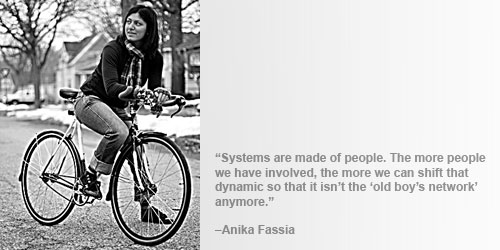By Tara Cavanaugh

Anika Fassia earned her master's in social work and social policy at the University of Michigan. She's taking part in a two-year fellowship with the Michigan League for Human Services to advocate on behalf of vulnerable communities in Michigan.
1. Tell us about your two-year fellowship.
We are a legislative advocacy organization, so we provide data on behalf of low-income families and foreign-born residents in Michigan. I also do a lot of work around race equity, and integrating that into policy decisions; I present around the state on the papers that I write and will go and testify at hearings. We need to change the way we talk about racial disparities and talk about it from an equity perspective – to bring light to the structural aspect of racism in our society. I think that's really hard to talk about in policy, especially when the majority of people who represent our state and our nation do not really represent our changing demographics – and by that I mean people who identify as LGBT, people of color, women, young people. The fellowship was supposed to increase diverse young voices in policymaking fields. I feel that because I come from a variety of backgrounds, being a young queer woman who was raised Muslim, I think I do bring a very unique perspective to state politics. I'm hoping to run in the next few years.
2. When you go around and present information about underserved populations, who are you talking to?
I do a lot of work with the Alliance for Immigrant Rights and Reform, Global Detroit, Michigan Forward, Detroit Parent Network, the Michigan Minority Health Coalition and the Ingham County Health Department. We present to a lot of nonprofits that do a lot of direct provider work. Since we're on the policy level, we happen to be disconnected from direct service providers, and direct service providers are disconnected from what's going on at the Capitol. So I think it's really important for us to bridge that gap, to know what's going on with parents and families. In terms of vulnerable communities, we don't do any direct work with the LGBT community; we typically work with the economically disadvantaged and immigrants.
3. It sounds like in your variety of work, you manage to educate others about the LGBT community, even if that's not the focus of the information you're sharing.
I think it's kind of happened by default, because I am queer, so I feel like I have to talk about it. It's something that's often looked over, because it's not always so visibly apparent. It's obvious that I'm a person of color; it's obvious that I'm a woman. It's not so obvious that I'm Muslim and it's not so obvious that I'm queer. I try to bring that to the forefront.
4. What would you be interested in running for in the next few years?
I want to run for local office. As hokey as it may sound, I believe in the power of community. And I think communities have been systematically stripped of their voice. And by communities, I don't just mean a geographic location, I mean all communities in an area. I believe in the grassroots level and I think it gets more convoluted as you work up the different levels of government. But I do think you can be a really effective representative or senator at the state level. My mentor is Rashida Tlaib; she was the first Muslim-American woman to be elected to the legislature in Michigan. She's incredibly involved and I'm learning a lot from her. If I were ever to be at the state level, I would like to be as involved as she is.
5. You're pretty young – 27 – to be so involved with politics and to have political aspirations. What advice do you have for young people?
I think that being civically engaged is so important. I understand that in under-served communities and socially and economically disadvantaged communities, it can be really hard. It can feel like: why even be involved in a system that doesn't even recognize me as a person? But systems are made of people. The more people we have involved – from diverse backgrounds and with unique perspectives – the more we can shift that dynamic so that it isn't the "old boy's network" anymore. And what I love about my job is that I get paid to be involved in the way that our state is run, that our country is run. I feel like to have an influence, to be able to change that, is so vital for young people, especially with the changing demographics of the country. I think we really need to step up to the plate. Young people should read the news, should attend rallies, should be involved, should know what's happening in their community. Even though it's been a really long fight, one small victory can feel so amazing. You'll feel so connected to your community. There are so many different types of community, and we all at the core want to be involved in something. I think being involved with how policies impact your life is really important.










